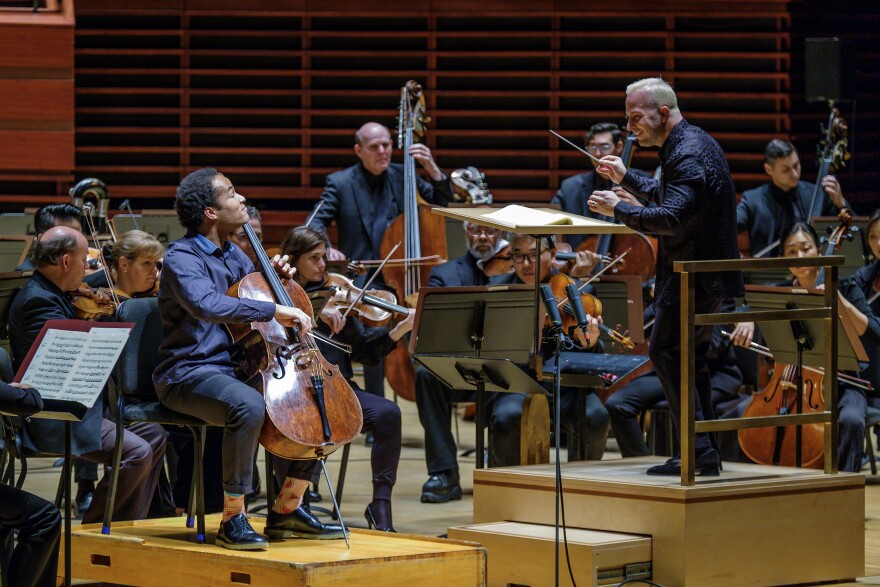Join us on Sunday, July 23 at 1 p.m. on WRTI 90.1 and Monday, July 24 at 7 p.m. on WRTI HD-2 as The Philadelphia Orchestra in Concert brings you an encore presentation of Haydn and Mahler plus a world premiere by Xi Wang. The program features two exciting soloists: British cello sensation Sheku Kanneh-Mason and the celebrated South African soprano Pretty Yende. The Philadelphia Orchestra’s music director, Yannick Nézet-Séguin, is on the podium.
Sheku Kanneh-Mason is featured in Joseph Haydn’s Cello Concerto No. 2 in D major. Kanneh-Mason first gained renown by winning the BBC Young Musician Competition in 2016. This led to a performance at the wedding of the Duke and Duchess of Sussex in 2018 — an event that made him a household name. He makes his Philadelphia Orchestra debut with this appearance, playing a work Haydn wrote some 240 years ago for another British cellist, John Cervetto. This concerto leaves its cadenzas up to the performer, and Kanneh-Mason composed one for the second movement — one of several topics he covers in an interview with WRTI’s Susan Lewis.
Pretty Yende joins the Philadelphians in the final movement of Gustav Mahler’s Symphony No. 4 in G major. This finale, titled “Das himmlische Leben” (“The heavenly life”) depicts paradise from a child’s viewpoint — complete with games, delicious food, friendly saints, and general merriment. Based on a poem from a collection of folk verses, it was first set by the composer in 1892, years before he began work on the Fourth Symphony. This song became Mahler’s point of departure as he composed the rest of the Fourth. Elements of the song are foreshadowed in each of the preceding movements, so that the finale itself seems like an immensely satisfying arrival. Mahler deliberately planned this work as a shorter, sunnier, and more intimate work than his first three symphonies. As Yannick notes in an interview with Susan Lewis, the Symphony No. 4 evokes classical composers, especially Haydn: “It's the peaceful one…it has more to do with this classical form and the magic of it and the purity.”
This concert opens with a world premiere by Chinese-born composer Xi Wang, commissioned by the Virginia B. Toulmin Foundation. The piece’s title, Enso, refers to a sacred symbol in Zen Buddhism: a circle hand-painted in a single, unbroken gesture that represents spiritual enlightenment. Like many of Xi’s works, Enso adds Chinese instrumental sonorities to the Western symphony orchestra. Audible from the very beginning of Enso are Tibetan singing bowls, small metal instruments traditionally used to aid meditative practices. A key theme representing light is given to the orchestra’s pianist, and recurs in various forms throughout the work. In Enso we also hear the chanting of monks – the voices of orchestra members themselves.
PROGRAM:
Xi: Enso (world premiere)
Haydn: Cello Concerto No. 2 in D major
Mahler: Symphony No. 4 in G major
The Philadelphia Orchestra
Yannick Nézet-Séguin, conductor
Sheku Kanneh-Mason, cello
Pretty Yende, soprano
Listen to The Philadelphia Orchestra in Concert broadcasts, every Sunday at 1 p.m. on WRTI 90.1, streaming at WRTI.org, on the WRTI mobile app, and on your smart speaker. Listen again on Mondays at 7 p.m. on WRTI HD-2. Listen for up to two weeks after broadcast on by clicking the "listen" button at the top of the page or at WRTI Replay.



